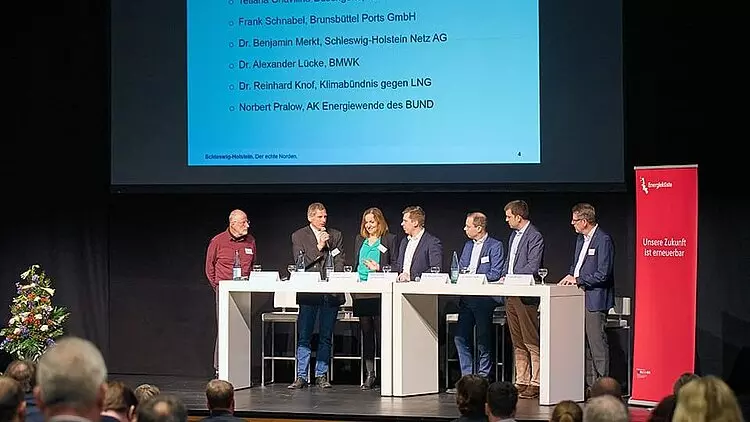The west coast of Schleswig-Holstein is increasingly expanding its importance as a hot spot for energy transition infrastructure. At the 3rd Infrastructure Forum Energieküste at the Elbeforum in Brunsbüttel, stakeholders from the regional economy, municipalities and associations discussed pressing issues of the energy transition today: From the grid operators' plans for new power lines, converters and substations, to the next steps in building a hydrogen economy, to the future electricity market design.
"For the first time, the grid operators are starting from the goal of climate neutrality as the starting point for line projects. This is a real innovation in grid expansion," says Energy State Secretary Joschka Knuth. We are currently experiencing a new pace in the expansion of renewables. Therefore, it is right that the planning for grid expansion should follow suit and that grids for the transport of hydrogen or CO2 should also be set up.
The challenge of providing sufficient land at the right time also moved the minds. "The electricity grid of the future must be built as efficiently and space-savingly as possible. New lines that run parallel to already confirmed lines should be planned with a common routing," said Knuth.
Stefan Mohrdieck, District Administrator of the Dithmarschen district, added: "The energy transition needs space. However, neither the population nor nature should suffer. Particularly with the major spatial changes on site, it is important to involve the people and communities. After all, future generations, in particular, will also benefit from a high-performance energy line network that has been developed in cooperation with all stakeholders."
Background
The Energieküste Infrastructure Forum is a joint event format of the Schleswig-Holstein Ministry of Energy and the Energieküste, an association of the districts of Dithmarschen, Nordfriesland, Steinburg and Pinneberg (energiekueste.de).
On Schleswig-Holstein's west coast, a conurbation of electricity generation from renewable energies is emerging. For this reason, the electricity grid (distribution and extra-high voltage grid) has been expanded for many years on the west coast to meet the requirements of the energy turnaround, for example through the new 380 kV west coast line as well as extensive 110 kV high-voltage grid expansion in the region.
In addition to the extra-high voltage lines already completed, further power lines will be added in Schleswig-Holstein according to the plans of the transmission grid operators for a so-called climate-neutral grid. Several new grid connection systems for offshore wind energy are planned for the further expansion of wind energy at sea, which is to play a prominent role in Germany's energy supply by 2045.
For hydrogen projects on the Energieküste, the need for long-distance hydrogen pipelines will also arise in the future. Since at the same time the use of natural gas as a fossil fuel will be replaced by renewable energies and hydrogen in the medium and long term, the conversion of the gas grids for the development of a hydrogen economy must already be considered today. Accordingly, the new ETL 180 gas pipeline from Brunsbüttel to Hetlingen is currently being built "H2-ready". When it comes on stream, planned for the turn of the year 2023/24, it will initially transport natural gas (landed in Brunsbüttel as liquefied natural gas, LNG), but later increasingly and at the latest from 2043 completely hydrogen.
Especially in the Brunsbüttel area, projects for the production of green hydrogen are currently being planned that exceed land capacities. In order to deal responsibly with the resources of land, water and biodiversity, close cooperation between the actors in the region is necessary.
In the Heide region, for example, the HySCALE100 project is pursuing large-scale hydrogen production and green methanol synthesis to decarbonise the basic industries of cement and chemicals. In a first step, an electrolysis capacity of 300 MW is to be built by 2026. In addition, the company Northvolt AB is planning to build a gigafactory in the Heide region for the production of sustainable battery cells.
Download
Currently only available in German
> Press release of the Schleswig-Holstein state government
> Website Ministry for Energy Transition, Climate Protection, Environment and Nature


